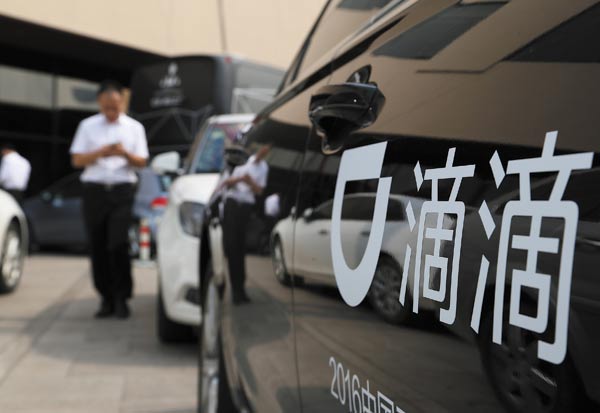
A pedestrian passes by a chauffeured car of Didi Chuxing, the dominant ride-hailing service provider in China. (Wu Changqing / for China Daily)
Decline in demand will mainly be in first- and second- tier cities initially
Car-hailing might hinder growth of the new purchase market in China, as the services have been granted legal status while local governments in major cities are restricting the registration and the use of vehicles.
With the introduction of the new regulation on car-hailing services, residents in major cities are being encouraged to use mobility services rather than make car purchases.
"The online car-hailing services better meet customers' needs, and will develop to be safer and more convenient under the government's official regulation. Car ownership, on the other hand, is being discouraged by means of restrictions on car purchases and use," said Charley Xu, a principal at Boston Consulting Group.
The U.S. consulting company predicts the Chinese auto market will shrink 2 percent each year over the next decade, based on a 5 percent decline in individual purchases for private ownership and a car-hailing fleet replacement rate of 3 percent.
Data from the China Association of Automobile Manufacturers show the sales volume in China totaled 24.6 million last year, and a 2 percent reduction in volume in the world's largest auto market would be a reduction larger than the combined Swiss and Russian markets in 2015.
Nielson Company Greater China says that chauffeured car-hailing and ride-sharing services save costs for passengers, weakening potential buyers' willingness to purchase their own cars.
Car-hailing services enable customers to travel by car without owning a vehicle, and so users bypass the upfront costs of a car purchase, and the costs that come with ownership, including the cost of a license plate in the major Chinese cities that restrict car purchases. Besides, customers don't have to worry about the one-day-a-week ban on car use based on plate numbers in urban areas.
Xiong Guangan, the father of two children in Beijing, said he and his wife dropped the chance to buy a second private car and let their car plate registration quota expire.
"I commute to my work in a chauffeured car on weekdays, usually one of Uber's, and our car is left in the parking lot. We only use it for family outings to visit places in the suburbs."


















































